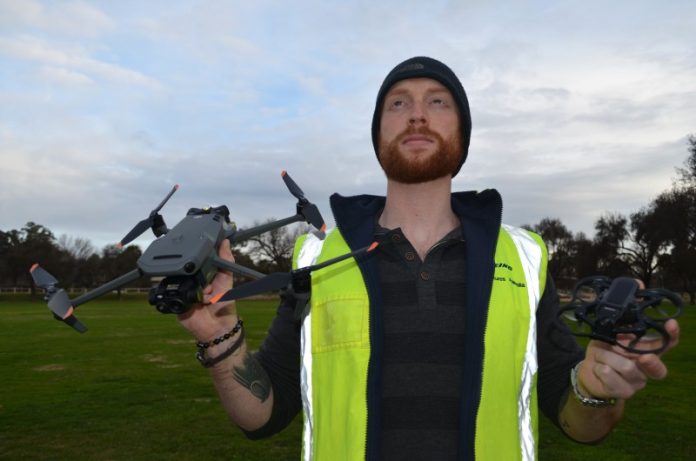
As drones become a common sight in our skies, their impact on our local communities grows increasingly significant. From enhancing efficiency and accuracy of repeatable jobs to offering improvements in safety and accessibility, drones present both benefits and challenges.
Castlemaine expert in drone engineering and RePL licence holder, Culum Revell, said he believed these unmanned marvels had huge untapped potential for a range of uses – particularly for sole traders. However, ensuring they are used responsibly is essential, and that’s where the community’s role in monitoring drone safety practices becomes crucial.
Culum has had a fascination with flight from a young age.
“It was really sparked following a helicopter flight as an eight-year-old and the rest is history,” he said.
“I later studied to be an aerospace engineer and formerly worked for Boeing.”
Culum has been flying drones for years and this later progressed to building and designing his own craft. He is currently focused on creating a small business in the niche area and offering his advice and expertise to a range of businesses.
“I am fascinated in the engineering, mechanics and design of drones. They come in all shapes and sizes,” he said.
In fact, he has ambitions to develop drone technology that can carry increased payloads in order to deliver essential goods to remote areas.
“My travels to Nepal last year really got me thinking about how drone technology could be used to drop food, medicine and other essential items to remote areas. I think there is potential there that I would really like to explore.”
In the meantime, Culum is passionate about educating the local community about drones and their uses and benefits.
“Drones are well used in the agricultural field and for videography. But I think there is also potential there for small business owners such as plumbers, electricians and those in construction to embrace this technology to make their lives easier,” he said.
“Drones, once a novelty, are now ubiquitous in our neighbourhoods. Trending data shows an ever-increasing drone ownership for hobbyists and industry related uses alike.
“These versatile devices are used for everything from monitoring bushfires, capturing stunning aerial images and precision 3D mapping to assist in search and rescue operations. However, with their growing presence comes the potential for misuse and associated safety risks.”
To mitigate these risks, drone operators for commercial use must adhere to a set of stringent, easy-to-follow Standard Operating Conditions as mandated by the Civil Aviation Safety Authority.
Culum said some of the key conditions to follow when using your drone were:
– Drone must not be flown over anyone, this includes sporting and family events, popular beaches, national parks, busy roads or pedestrian areas.
– Drone must not be flown within 30 metres of horizontal distance of anyone not associated as the operator’s crew.
– Drone must not exceed an altitude of 120 metres (400ft) above ground level (not to be confused with Mean Sea level).
– Drone must remain within the operator’s line of sight: not viewed through a device such as a video screen or goggles and, only to be flown during daylight hours and, must avoid clouds, mist, fog, rain, dust and smoke.
– Avoid flying your drone within 5.5 kilometres of controlled and non-controlled airports and aerodromes.
– If low-flying aircraft are sighted in the area, manoeuvre away and land in a safe and controlled manner.
– Operators must not control more than one RPA at a time.
– Drone must not interfere with emergency operations without specific approval.
It should be noted that these conditions may not apply to every drone operator’s flight plan, operators with ReOC (Remotely piloted aircraft Operator’s Certificate) may apply for permissions and approvals to fly outside these conditions, further information can be found on CASA’s official website.
“The community plays a pivotal role in ensuring drones are used safely. Residents are encouraged to stay vigilant and report any suspicious or unsafe drone activities to local authorities and CASA. It is essential to do both,” Culum said.
Online resources, including CASA’s website and mobile apps, offer more accessible information on current regulations and safety tips. By staying informed and proactive, residents can help create a safer environment for everyone.
If you have questions or queries about drone usage, whether for sport, recreational or hire, call Culum on 0447 971 496 or email culum1997@gmail.com







